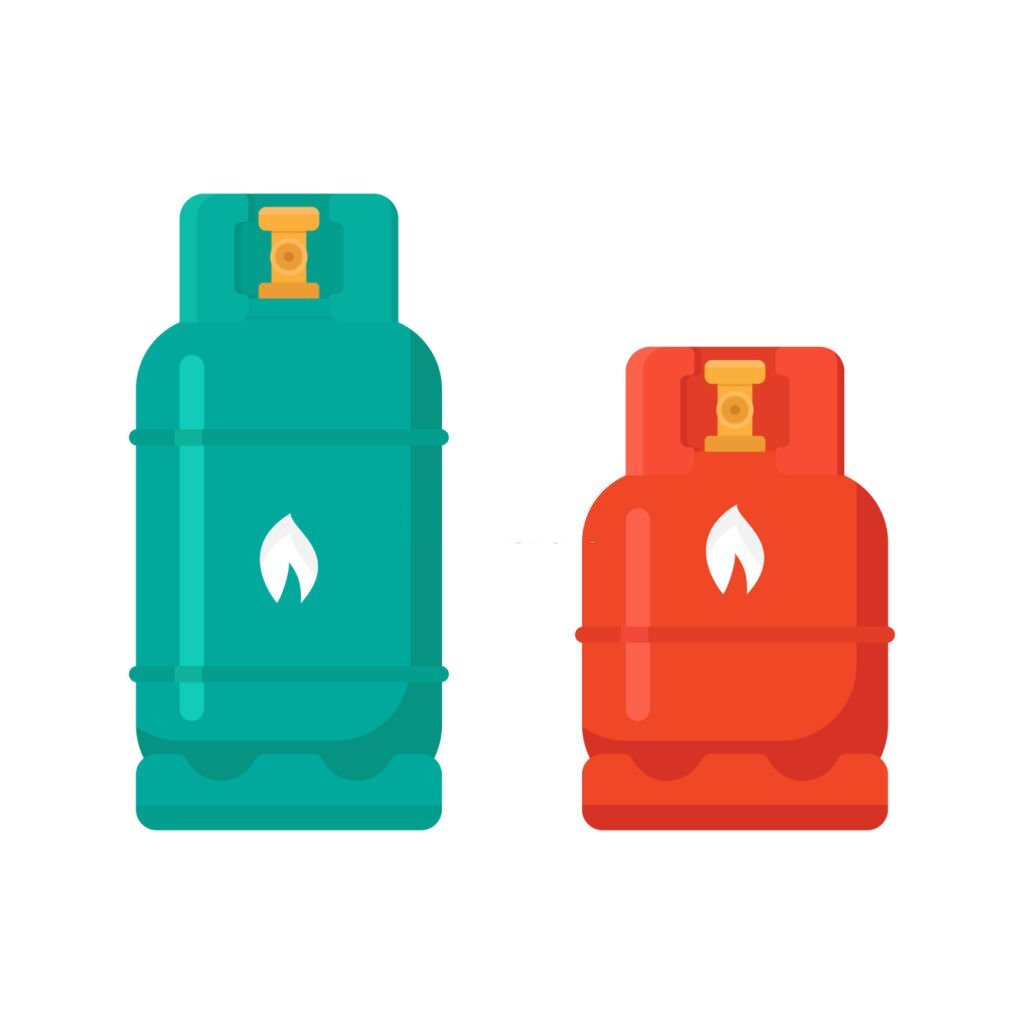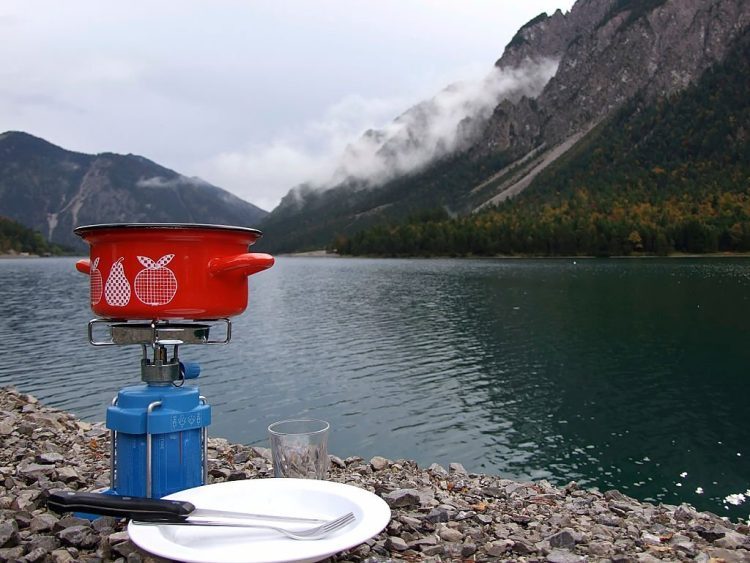Outdoor camping includes overnights to stay close to nature for a limited time using some protective shelter e.g. tents, camping chairs, and recreational vehicles like caravans, etc. Camping has been a way of life for centuries but officially it started in the USA at the end of the 1860s. Since then, the following question has gained great importance,
Which fuel is better for an outdoor camping stove, Propane or Butane?
Though there is no one perfect answer to this question based on needs and type of camping, there is always the best option.
Propane and butane fuels are popular choices for outdoor camping as they are easily available in all main sports, hardware, and retail stores.
Choosing the best fuel for your camping stove is very important as butane and propane are not interchangeable.
There are several factors to be considered before picking the best one e.g., how much weight you can carry, how many days you plan to stay, fuel availability and temperature sensitivity, etc.
In this article, we will highlight all important aspects of propane and butane fuels and the main differences between them to help you decide which fuel is the best option for your next outdoor adventure.
The main difference between Propane and Butane gas is the boiling point. Butane gas has a boiling point of 32 F (-0.4°C) which is very close to the freezing point. While propane has a comparatively lower boiling point and it boils at -44°F (-42°C) which makes it more suitable for cold weather.
Difference Between Butane and Propane Gas
Propane, also known as liquefied petroleum gas or LPG with a chemical formula (C3H8) is a colorless, easily liquefied, non-toxic, odorless gas.
Propane gas is compressed at very high pressure compared to butane and has a higher chance of explosion if not handled carefully.
A propane stove is most suitable in extremely cold weather and at high altitudes where sometimes you need to use a stove indoors.
You can buy a standard butane gas stove for less than $60 while a propane gas stove will cost you more than $100.

Butane is a colorless, odorless, highly flammable hydrocarbon gas with the chemical formula (C4H10) and it is one of the main hydrocarbon components of raw natural gas. There are some other important features associated with Butane gas.
For example, Butane gas requires less pressure to be stored in a canister so a butane fuel stove is comparatively safe and lighter than a propane stove.
Additionally, butane gas burns 12% more efficiently and is comparatively slightly more expensive than propane.
Pros and Cons of Propane and Butane Gas Stoves:
Both butane and propane stoves are popular choices for hiking, outdoor camping, picnic, emergency, etc. However, there are some key differences to understand before picking the right one and it largely depends on individual needs and preferences.
Here, we will discuss the pros and cons of both fuels to understand their characteristics and benefits of each, so you can decide which fuel is best for your next outdoor trip.
Pros of Propane
The following are the main advantages of propane fuel as compared to butane.
Low Boiling Temperature
Propane gas has a lower boiling point than butane gas and its starts evaporating into a gas at -44°F (-42°C) in standard atmospheric pressure.
To be used at room temperature (70° F or 21° C) it has to be kept at a pressure of about 850 kPa (kilopascal). Normally, a ’20 lb’ propane cylinder is used for grills.
If you are planning outdoor camping in the mountains or in a place where the temperature of your surroundings is expected to drop below the freezing point (-1°C), then a Propane gas stove will be the best choice as it performs better in lower temperatures.
More Efficient and Eco-friendly
Propane fuel is considered more efficient in combustion and it produces more heat than butane gas due to its chemical structure.
Further, propane is widely used in outdoor camping due to its safe, non-toxic, and clean-burning fuel characteristics.
Availability
Convenience counts when outdoor camping. Propane gas stove works well in all seasons and most people prefer propane gas stove over any other.
Finding a propane gas stove is not a problem across the US and many famous companies are offering their products at competitive prices in almost all big sports, hardware, or retail stores.
Cons of Propane
The following are the main disadvantages associated with propane gas stoves.
Weight & Size
Weight is an important factor to be considered while traveling.
As a general rule, the weight of your backpack should not exceed 20% of your body weight.
In general, propane fuel canisters are heavier than butane canisters and the reason is that the propane gas has a lower boiling point and requires a higher pressure to store it in heavy, stainless steel canisters.
Safety
It is a common perception that propane gas is lighter than air which is not true but this rule applies to natural gas.
Propane gas is heavier than air and in case of leakage, it will be concentrated on the floor level around the stove which can be dangerous, especially in homes and closed areas.
Furthermore, Propane requires high pressure to be stored as a liquid in heavy canisters which increases the chance of explosions if not handled carefully.
Higher Cost
Cost is an important factor to be considered when deciding between propane and butane gas stoves for outdoor camping.
In the USA, propane gas is slightly less expensive than butane but what makes it expensive is not the gas itself but the price of canister.
Pros of Butane
The following are the main advantages of a butane fuel as compared to propane.
Smaller Size and Weight
Butane gas canisters are smaller in size and easy to handle because butane gas can be compressed at lower pressure in a small canister.
Due to its chemical structure, it requires only one-fourth the pressure of propane gas to compress it in a lightweight, aluminum or stainless steel canister.
Easy to Carry
Butane stoves are generally made of lightweight materials and butane fuel itself is comparatively lighter than propane.
So, butane stoves are easy to carry even when fully loaded with fuel which makes it perfect for backpackers.
Safety
Both fuels are safe to use as they are non-toxic, narrow flammability hydrocarbon gases but necessary safety precautions must be followed to avoid any risk.
However, butane gas needs less pressure to be compressed, so there are fewer chances of explosion.
Higher Fuel Efficiency
Butane has a density of 2.4kg/m3 while propane has a density of 1.8kg/m3 at 25°C. Despite its smaller size, a butane gas stove lasts longer and burns 12% more efficiently compared to other lower-density fuels.
Cons of Butane
The following are the main disadvantages associated with butane gas stoves.
Higher Boiling Point
Butane gas has a boiling point of 32 F (-0.4°C) which is very close to the freezing point.
However, the butane gas stove will not work if the temperature of your surroundings drops below the freezing temperature because all the gaseous butane will turn to liquid inside the canister and there will be no gas to burn.
As a result, a butane gas stove is better for summer or warm backpacking trips.
More Costly
Butane gas is slightly more expensive than propane gas. Although, prices are influenced by several reasons and one of the important reasons is “Refilling Capability”.
Propane cylinders can be refilled easily but butane gas stoves use disposable canisters which cannot be refilled.
It increases its cost further as every time you need to buy a new gas canister and the empty canisters can be harmful to wildlife.
Prices of Propane and Butane Fuel in the United States
Propane and butane fuel is by-products of natural gas and their prices increase as the price of natural gas increases.
Although, the prices of both fuels largely depend on the type of canister, its size, weight, brand, etc.
But setting aside all other factors, let’s simply focus on the retail cost of each gas for comparison purposes.
The following table shows the costs of propane and butane from 2002 to 2021.
| Butane | Propane | ||
| 2002 | 3.494 | 3.186 | |
| 2003 | 7.203 | 6.571 | |
| 2004 | 8.171 | 8.074 | |
| 2005 | 9.009 | 8.042 | |
| 2006 | 12.427 | 10.82 | |
| 2007 | 10.422 | 9.757 | |
| 2008 | 17.922 | 16.493 | |
| 2009 | 8.868 | 7.961 | |
| 2010 | 15.332 | 14.31 | |
| 2011 | 16.319 | 14.724 | |
| 2012 | 19.039 | 14.115 | |
| 2013 | 16.465 | 9.102 | |
| 2014 | 14.395 | 15.23 | |
| 2015 | 6.648 | 5.196 | |
| 2016 | 4.733 | 3.629 | |
| 2017 | 9.837 | 8.084 | |
| 2018 | 9.62 | 9.864 | |
| 2019 | 7.787 | 7.21 | |
| 2020 | 6.97 | 4.399 | |
| 2021 | 8.548 | 9.463 | |
| Dec 2021 | 12.198 | 11.247 | |
*Dollars per million British thermal units
Looking at the table above, it is quite clear that propane gas is slightly cheaper than butane. However, the cost of gas does not tell the whole story as both gases have different amounts of energy and characteristics.
For example, butane gas is denser than propane and a gallon of butane will last slightly longer than propane.
However, propane gas canisters can be refilled easily to decrease the cost of buying but butane small-size canisters are disposable and cannot be refilled.
In short, only the cost difference is not significant enough to influence your decision too much.
Conclusion: Which One to Choose, Propane or Butane For Camping?
Propane and butane both are popular fuels for camping and the decision between a propane or butane stove depends on your specific camping needs and preferences.
If you are planning outdoor camping on high mountains or in a place where the temperature of your surroundings is expected to drop below the freezing point (-1°C) then a Propane gas stove will be the best choice as it performs better in lower temperatures.
Whereas, butane stove is relatively inexpensive, more compact, and easy to carry. It is widely used for camping and hiking in summer but it is not suitable in extremely cold weather and at high altitudes.
Regardless of the type of stove you choose, it is very important to follow all safety standards to avoid accidents and to ensure a safe camping experience.
We hope this article helped you to select the best stove for your next outdoor adventure. Meanwhile, you can also read about best dual-fuel camping stoves if you are interested to get one.
FAQs
Which burns hotter butane or propane
Propane burns hotter than butane due to its chemical structure and it produces more heat per unit volume than butane which make it ideal in all kind of weather.
Why is propane used more than butane?
Propane and butane both are popular fuels but propane is widely used by pack packers due to the following main reasons:
- It works in all kinds of weather
- Widely available across the country
- It has a lower boiling point
- It is cheaper than butane
Can I mix propane and butane?
Propane and butane both are non-polar so they can be mixed easily. The resulting mixture (liquid petroleum gases) will have different properties than the individual gas.
However, it is not recommended to mix both gases without proper supervision as it can be dangerous without following the standard procedure.
Are propane and butane cylinders interchangeable?
Propane and butane cylinders are generally not interchangeable. The main difference comes from the regulator of the cylinder.
Propane has a lower boiling point and its regulator cannot be used for butane which is denser than propane.
Is LPG the same as propane or butane?
LPG is a group of gases commonly used for heating and cooking. Propane and butane both are part of the LPG family along with isobutene and other hydrocarbon gases.
Are all butane canisters the same?
No, not all butane canisters are the same. They vary from brand to brand according to their size, shape, amount of gas they contain, and compatibility with other stoves.

Hi, I’m Masab Jamal, the founder and head editor of this blog. I love to spend most of my time in the wilderness. Apart from camping and outdoor life, I’m a full time blogger.

